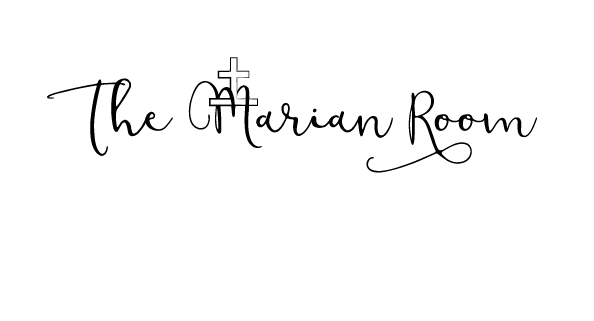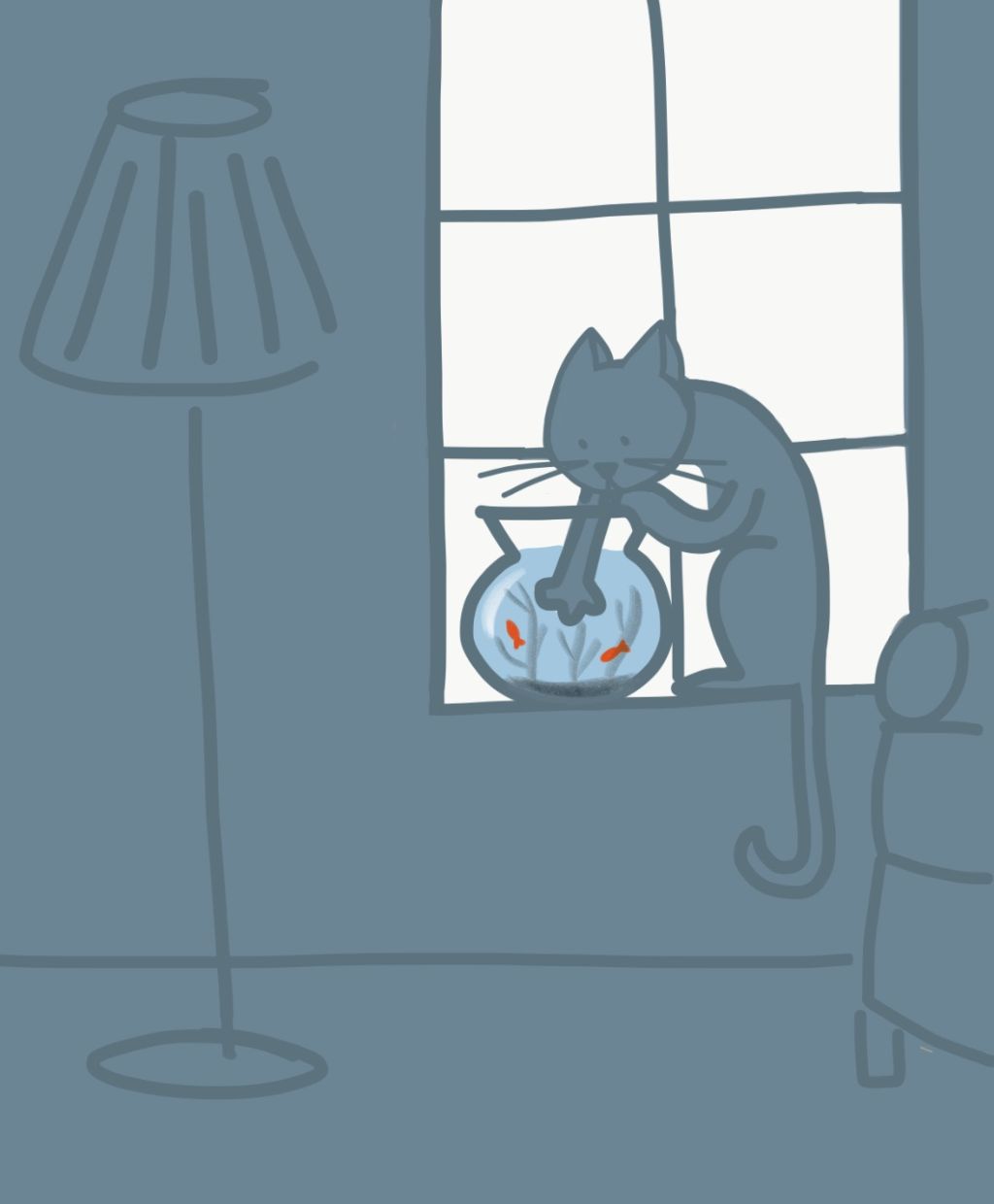“The man standing in his own kitchen-garden, with fairyland opening at the gate, is the man with large ideas.” G.K. Chesterton
Kitty, The Household Fairy, has been at it again. Several weeks ago, we were expecting an important guest, the kind of guest, that before their arrival, you look about the home to catalog what might be lacking, in order to either repair it, or toss it in the closet. At that time, I noticed that the Feline Fairy had obviously been taking her claws to the hallway banisters (again!); shredding the paint to such an extent that it looked downright scary. I pointed these out to the Sacramental Spouse, who did not look happy. He had not reckoned at the time of taking his vows that he would be dealing, for the majority of his adult life, with feline habitual offenders; the first being, Sassy, an eighteen year housemate; and, now, Kitty; but he, as usual, took it in stride, and I caught him giving the fury offender a treat at his desk a couple of hours later: Kitty looks at him with her set of crossed eyes, and the next minute, he’s handing out cat treats like its Halloween.
The next day, he sanded the damaged banisters, and splashed them with a fresh coat of paint.
Things looked better, but I should have known they would not remain as such.
The guest arrived, and we were having an informal gathering with other friends and family, when I heard a shriek followed by a question loaded with disgust and horror: “What’s she doing?”
I looked in the hall to see Kitty on top of one of the banisters doing what she does best: shredding, and shredding. If I had better eyesight, I am certain paint strips might have been seen floating through the air. It was an usual sight to see at a house party, to say the least.
I asked Kitty politely to get down, but she continued to shred, throwing a glance my way between the destructive motion of her paws. I felt a moment of fear, but regained my sense of composure, remembered I was the mistress of the house, and gently nudged her off the banister.
I did not try to explain her actions to my guests, as I do not understand them myself.
We had cats in my childhood home, and I do not recall a single shredding incident; and, I admit, that after thinking about Kitty’s tendency to shred, I kind of like it. I like it when things are not perfect. When I see the (again!) shredded banister, it reminds me of Kitty, The Household Fairy, a creature fierce and free (G.K.Chesterton), who despite her seeming domestication, still retains a certain wild-catness that will not be tamed.
Yes, Kitty is a household fairy in the great traditions of fairies, and if there isn’t a household fairy about, well, it’s simply a dull house. It is as G.K. Chesterton said (paraphrase), the home is a wild and untamed place; the home is the place of adventure and life:
“Of all the modern notions generated by mere wealth, the worst is this: the notion that domesticity is dull and tame. Inside the home (they say) is dead decorum and routine; outside is adventure and variety. This is indeed a rich man’s opinion. The rich man knows that his own house moves on vast and soundless wheels of wealth, is run by regiments of servants, by a swift and silent ritual. On the other hand, every sort of vagabondage of romance is open to him in the streets outside. He has plenty of money and can afford to be a tramp. His wildest adventure will end in a restaurant, while the yokel’s tamest adventure may end in a police court. If he smashes a window he can pay for it; if he smashes a man he can pension him. He can buy a hotel to get a glass of gin. And because he, the luxurious man, dictates the tone of nearly all ‘advanced’ and ‘progressive’ thought, we have almost forgotten what a home really means to the overwhelming millions of mankind.
For the truth is that to the moderately poor the home is the only place of liberty. Nay, it is the only place of anarchy. It is the only spot on the earth where a man can alter arrangements suddenly, make an experiment or indulge in a whim. Everywhere else he goes he must accept the strict rules of the shop, inn, club, or museum that he happens to enter. He can eat his meals on the floor in his own house if he likes. I often do it myself; it gives a curious, childish, poetic, picnic feeling. There would be considerable trouble if I tried to do it in an ABC tea shop. A man can wear a dressing gown and slippers in his house; while I am sure that this would not be permitted at the Savoy, though I never actually tested the point. If you go to a restaurant, you must drink some of the wines on the wine list, all of them if you insist, but certainly some of them. But if you have a house and garden, you can try to make hollyhock tea or convolvulus wine if you like. For a plain, hardworking man, the home is not the one tame place in the world of adventure. It is the one wild place in the world of rules and set tasks. The home is the one place where he can put the carpet on the ceiling or the slates on the floor if he wants to. When a man spends every night staggering from bar to bar or from music hall to music hall, we say that he is living an irregular life. But he is not; he is living a highly regular life, under the dull, and often oppressive, laws of such places. Sometimes he is not allowed even to sit down in the bars; and frequently he is not allowed to sing in the music halls. Hotels may be defined as places where you are forced to dress; and theaters may be defined as places where you are forbidden to smoke. A man can only picnic at home…” G.K. Chesterton from What’s Wrong with the World
The World is turned upside down in Catholicism.
The World says you are free when you can leave home, and travel all around, buying what you want, seemingly obliging all of your desires. Yet, as attested to by the lives of “stars” and millionaires, such desires only escalate, and are never satisfied.
They grow and consume, they are literal chains.
While Catholic thought (and the lives of our ancestors attest to) says the opposite: a person is free when they stay at home. A certain natural contentedness floods the heart when the proverbial door is closed to the world, and a man can sit by the fire, take a warm drink, and read a book.
The walls and doors of his home do not enclose him, but enlarge him; enlarge his heart and his soul. It feeds him, so that he might go out the next day into the world of rules and regulations to make his living by the sweat of his brow.
Why do atheistic Communist (and Masonic) sorts always push communal living? Why did the Soviets build huge ugly apartment blocks that looked like prisons rather than homes? Why do such sorts wish to deny man the simple pleasure of his home life? I think it is because man, without the refreshment of his home, loses his view of the Eternal, of the view of Other Things, of the life beyond, and his view of God.
In Josef Pieper’s Leisure:The Basis of Culture*, the Catholic philosopher, Pieper, describes the importance of non-utilitarian based leisure. He states that without such leisure, man is disconnected from contemplation, disconnected from culture, disconnected from God. If a person was pushing for a world without God, he would destroy the home life of the common man. He would make the world outside the home appear glitzy and glamorous, and the world within the home, dull; but, as noted above, the opposite is the truth.
The world within the home is never dull or tame.
There is an adventure always at hand.
So, when you walk through the doors of a certain brick Colonial on a nondescript street in a nondescript town, don’t mind the banisters: Kitty says the home is her palate, and that’s art you are looking at!
May you have a good day.
•SCF
•Kitty, The Household Fairy (I): link.
•Image: Kitty by J.F. Schmiesing






